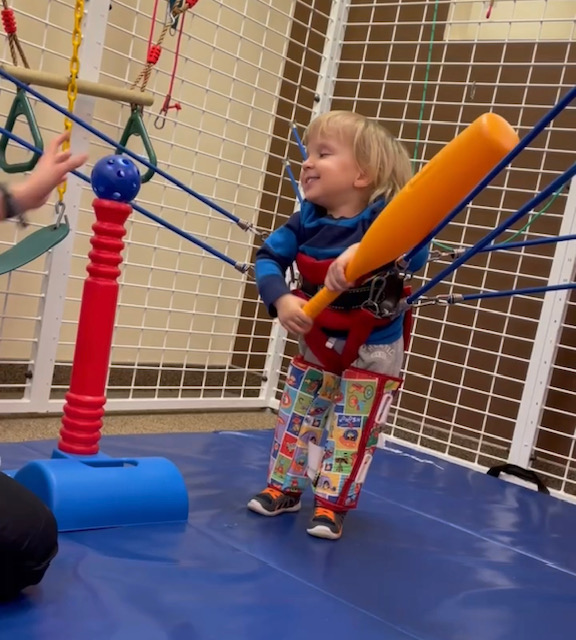

- Call 908 543 4390
- Email
- Dr.Joni Redlich PT,DPT


We all learn about our 5 senses as children: smell, touch, see, hear and taste. Our sensory systems are so important to how we experience each day. We smell the delicious food that is cooking, hear the sizzle from the pan and can’t wait to get a taste. Our sensory systems also underlie our attention, focus and motor control. An important sense that may not be part of our daily consciousness, but is integral to our ability to move, play and learn, is our sense of balance.
Read more
Guest Post by Z’s Mom
As an Occupational Therapist, I have often joked about “inflicting myself on my kids”….and as a Mom of three boys, now 19, 22, and 24, one of the things that helped me survive raising them was picking my battles.
When our oldest son was 6 years old, we were already battling dyslexia and dysgraphia, even though he was a bright boy. It frustrated him when he wanted his letters to look perfect but could not get them to look that way, and he had daily stomach aches and visits to the school nurse. When he did not have motivation or desire to ride a bicycle, and we lived on a busy street with a bumpy sidewalk, and even trips to the park did not inspire him to persevere on the bike riding, we decided not to upset him any more until he wanted to try again. Read more
In physical therapy we’re mostly focused on improving movement skills or maximizing ability. However, there are other essential factors that need to be present in both children and adults for physical therapy or any other form of healing to lead to wellness.
The most powerful lesson that I learned during my almost two years feeling dizzy was to take control of the things that I could control. When we face illness or disability there are many different ways to approach it, as there are different ways to approach life. Read more
Aim To compare the effects of a supported speed treadmill training exercise program (SSTTEP) with exercise on spasticity, strength, motor control, gait spatiotemporal parameters, gross motor skills, and physical function. Method Twenty-six children (14 males, 12 females; mean age 9y 6mo, SD 2y 2mo) with spastic cerebral palsy (CP; diplegia, n=12; triplegia, n=2; quadriplegia n=12; […]
I wanted to share some pictures of our trip to the new accessible playground in Ann Vann Middlesworth Park in Hillsborough. The playground provides a great sensory and movement experience to all children regardless of ability. The entrance to the playground structure is a ramp. No stairs in sight. Read more
“My son can’t keep up with his twin.”
“My daughter is always tripping and gets frustrated.”
“We finally got answers as to why my child is delayed, but now what?”
Do these concerns sound familiar to you? Have you been worried about your child and wondering where you might find answers and help? If so, you’ve come to the right place! Let’s start by answering the question-
What is a Pediatric Physical Therapist and Who Do They Help?
Pediatric Physical therapists (PTs) are licensed health professionals who have specialized knowledge and experience in the unique aspects of working with children and their families to improve motor development, independence, fitness and active participation in the family and in the community. Pediatric PTs work with children from birth through adolescence and participate on teams with other specialists, including physicians, occupational therapists and speech therapists.
They work with children to improve their brain-body connection, balance, strength, body awareness, coordination, and movement skills from crawling and walking to jumping and hopping. Pediatric physical therapists work with children to improve their sensory awareness and motor abilities. Improvement these skills can have a far ranging impact on the child beyond the movement itself, such as improving confidence, success in school, and social interaction.

Pediatric physical therapy often looks like play, but that is part of the magic! Pediatric physical therapists know how to engage the child with fun, share the joy of movement and combine that with the science of the brain and body. All these pieces come together to stimulate to new skills that the child can use in daily life at home, at school and in the community. New skills means new confidence and new success!
Read moreAs published on ourjourneythruautism.com
Exercise or therapy balls have been used in the therapy world for many years as a tool for core strengthening, developmental exercises, and for sensory stimulation. More recently they have popped up in gyms and people’s homes as an inexpensive, fun and dynamic piece of exercise equipment. Read more
As printed on ourjourneythruautism.com
Summer is the perfect time to take advantage of all the therapeutic benefits of swimming and playing in the pool. Many children who have difficulty controlling their bodies for sports and gross motor activities will have success moving in thewater. Its also such a calming and organizing sensory environment that it can provide a grounding experience for the child that can often last for the rest of the day.. Read more
Physical therapists work with so many different populations and within those populations are completely different expectations for how quickly the person will achieve their goals. This is a significant issue when dealing with insurance companies. I have been frustrated many times when an insurance company wants to treat a child with a developmental disability with the same progress expectations as an adult with a knee replacement. On the other hand, it is also an issue when children are coming for therapy week after week for years and sometimes it develops into an unclear end and amorphous goal. Read more
